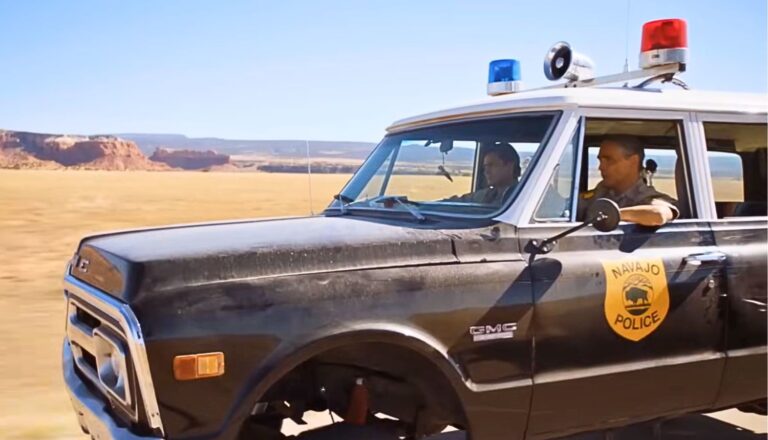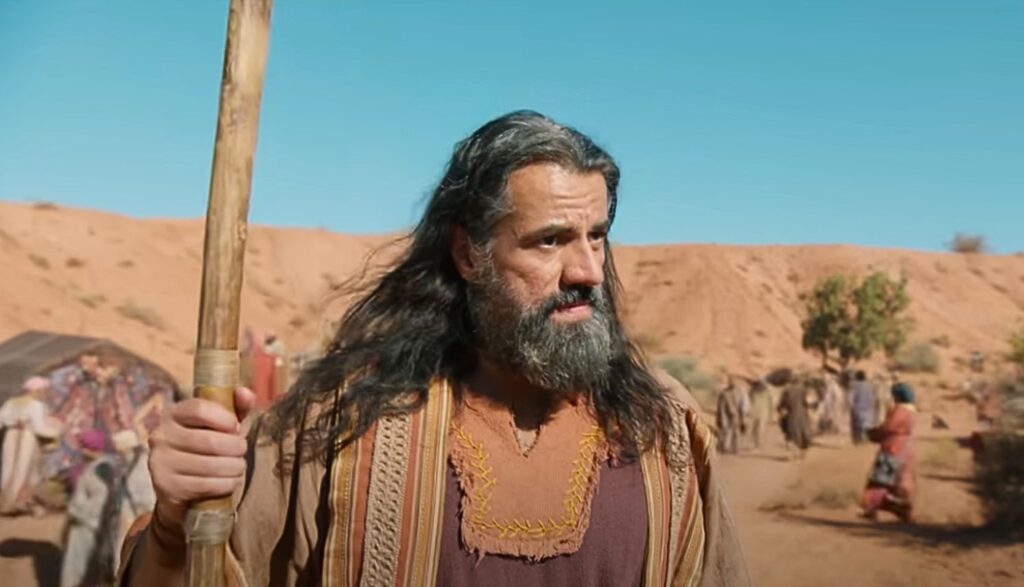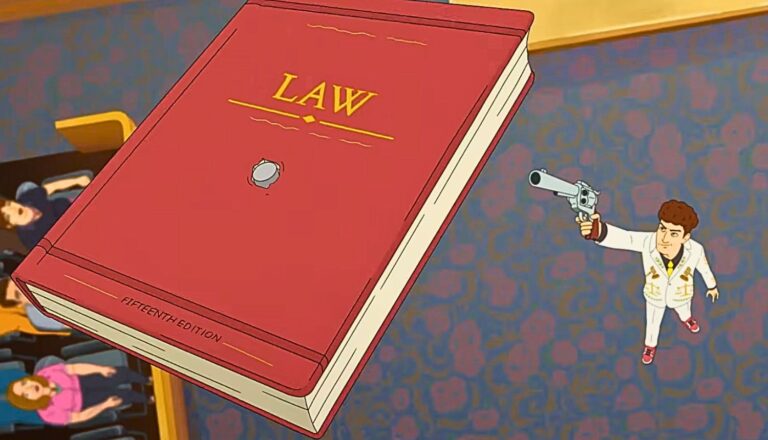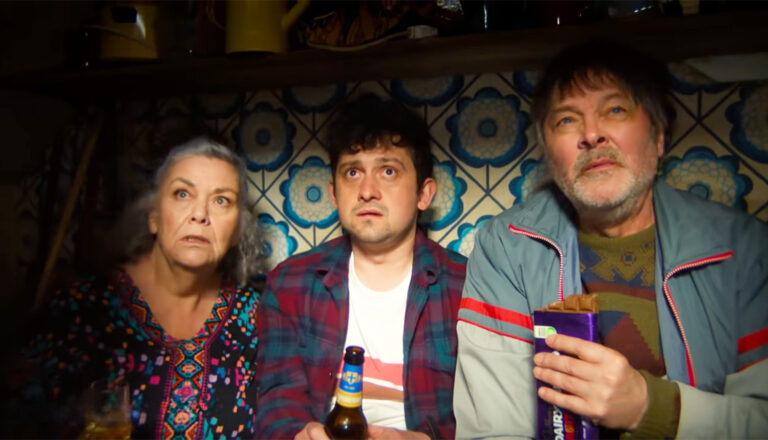
Dark Winds
AMC+ brings to life a murder-mystery series set in New Mexico, steeped in Navajo ways and filled with dark magic.

“Love what you do, and you’ll never work a day in your life.”
Yeah, right.
Sure, maybe that’s what motivational speakers tell you. But even they know the truth: We may love what we do. We may even feel called to do what we do. But sometimes, even the best jobs can be just the worst. You get up. You do your thing. You plow through boredom and scramble to deal with the day’s crises du jour. And then you go home and prepare to do the whole thing again tomorrow.
Yep, even have the best jobs can leave you feeling like you’re stuck in the wilderness.
Moses can relate.
Did Moses ask to lead his people out of Egypt? Did he apply for the gig? Absolutely not. If the former Egyptian prince had his druthers, he’d be still shuffling around with his father-in-law’s sheep.
But you don’t say no to a Burning Bush—especially One who also happens to be your Lord and God.
And at first, the job had everything Moses could ask for. Power! Adventure! Plagues! After some strenuous, high-stakes negotiation, Moses convinced Pharaoh to let his people go. Job well done, right? If God was apt to give out yearly performance reviews, Moses would surely have earned a hefty raise. Maybe even a bonus.
But alas, Moses doesn’t get a paycheck from the Almighty—not one he can spend on Amazon, anyway. And it seems as though getting out of Egypt wasn’t the end of Moses’ assignment: It was the beginning.
Now he’s leading the Hebrew people through the desert. And that, my friends, is a thankless job. Talk about “other duties as assigned.”
Moses does lean on others to help get the job done. Aaron’s good with a joke, and the people seem to like him, so that’s nice. Miriam can be a little high strung, but she’s slowly earning the trust of the other women in camp. Zipporah? Well, Moses’ wife knows just what to say to keep Moses’ spirits up. And let’s not forget about Joshua! Yes, Joshua. Can’t forget about him. Even if you try.
And so Moses and the Hebrews go about their days. “There’s not much water, and what there is came from a rock that my brother hit with a staff,” Miriam says. “Every night we hunt quail for dinner. And every morning we gather magic bread from the ground. And so far, every civilization that we’ve come across has tried to kill us. But hey. At least we’re not in Egypt.”
The creators of The Promised Land (an independent, crowd-funded show now playing on YouTube) describe their new series as Moses meets The Office. And that’s just about right. Never mind that television cameras won’t be invented for another 3,200 years or so; Moses and his fellow desert sojourners are the subjects of this mockumentary. And that, obviously, only begins our list of anachronisms.
Mitch Hudson, writer and director of the six-episode series, is a veteran of The Chosen, another show that upended expectations of how a Bible-based bit of entertainment can look and feel. Well, The Promised Land quadruples down on The Chosen’s creative license, pushing it deep into territory well past what you might’ve learned in Sunday school. Moses is a harried, insecure CEO. Joshua is an annoying try-hard. Miriam is glum and sarcastic. And one of the “Hebrews” is an Egyptian soldier, trying desperately to fit in after getting caught on the Hebrew side of the collapsing Red Sea.
One Israelite, Moses’ cousin (Korah), is suspicious of the interloper, speculating to the cameras that perhaps he hasn’t been circumcised. And in an ensuing conversation with the Egyptian (Chisisi), his eyes fall to Chisisi’s crotch in speculation.
That brings us to the other potential pitfalls of The Promised Land: It takes some of the most blush-worthy moments from Exodus and turns them into jokes. Don’t remember that Zipporah touched Moses’ foot with their son’s snipped foreskin? This show will remind you. All those Hebraic rules regarding menstruation or seasons of sexual abstinence? They’ll come up here, too. The Promised Land uses these passages as a gateway to an easy, eyebrow-raising joke or two.
But here’s the thing: Eyebrow-raising or not, they do come straight from the Bible. The Promised Land, as laugh-worthy as it’s intended to be, takes its Bible, and the show’s own purpose, seriously.
“We’re not mocking Scripture,” the show’s website reads. “We’re mocking ourselves as we try to live it out.”
The site goes on. “Comedy creates connection, lowers defenses and allows audiences to see themselves in the story,” it reads. And so it does. The Promised Land was dropped in my reviewing lap at an interesting period of my own professional life, so Moses’ struggles and insecurities struck a nerve. It connected with me in a way that, perhaps six months earlier, it would not have. And its intended lessons (because the show does come with them) hit home. Such is the power of story.
Another note about the, um, creative way that The Promised Land uses Scripture: When people watch The Chosen or House of David, some might imagine those narratives to be a faithful retelling of what the Bible says (even as the shows’ own creators caution otherwise). They feel grounded enough to potentially confuse the more casual Christian. But because its premise is so outlandish, The Promised Land runs no such risk. This is a comedy, plain and simple. If anything, people might be surprised at how many of the jokes are grounded in Scripture.
That said, this show should still be approached with caution. Its occasionally crude sense of humor (Bible-based or not) will make this a potentially embarrassing watch with children. Its lack of reverence might make many faithful viewers pull out their hair.
And perhaps it’s important to remember how much bloodshed surrounds the events of Exodus. Just as the story of Noah is far more grim than cute, colorful preschool pictures would make it seem, the Hebrews’ Exodus out of Egypt and to the Promised Land was no laughing matter for those who lived it.
The Promised Land can be really, truly funny. I literally laughed out loud several times as I was reviewing it. But sometimes I caught myself: Should I be laughing? I thought. And that’s a good question for would-be viewers, too.
It’s been a minute since Moses led the Israelites out of Egypt, and the novelty of wandering around in the desert has worn off. Ticking off the complaints of his people, Moses says, “Just once, it would be nice if there was a line of people who would say, ‘Hey Moses. Thank you for getting us out of Egypt. Can’t wait to get to the Promised Land with you. Have a great day.’”
A lot of Moses’ on-the-job stress comes from listening to people’s issues from dawn to dusk. But Jethro, Moses’ visiting father-in-law, has a novel idea of how to ease the burden. Meanwhile, Miriam struggles to bond with Zipporah, Moses’ newly arrived wife.
Moses can’t wait to see Zipporah again. “I’ve barely seen her since she threw my first son’s foreskin on my foot and called me a bridegroom of blood, so we’ve got a lot to catch up on,” he tells the camera crew. We hear a joke involving circumcision, too. And when a Hebrew shows a boil to Moses and asks him what to do about it, everyone who sees it moans and almost retches in disgust. (The image is pixelated.)
Miriam suggests washing it now and then, which everyone dismisses or ignores (coming as it does from a woman). But when Moses says the same thing, the Hebrews applaud. (Through Miriam’s eyes, we get a sense of how women were treated at the time.)
The show begins with the Israelites’ battle with the Amalekites, during which Moses needed to hold up his staff to ensure God’s favor and victory. (It proves not to be as easy as it looks, as we know from the Bible.) We don’t see the battle, but we hear a lot of frenzied conversation. And when Aaron greets the “documentary crew,” he advises them not to take pictures of the “bloody, horrible battle.” (They don’t.) The opening sequence depicts a cartoonish version of many of the plagues that ravaged Egypt. Cows die in the cartoon—shown by the “X”’s over their eyes—but the segment largely skips over the deaths of the firstborn.
An Egyptian, Chisisi, does his best to pretend to be a Hebrew. Aaron expresses doubt that he’ll ever make it out of the desert. Someone tells Moses, “If eating meat at night is a sin, I don’t want to be righteous.” Moses’ cousin Korah is dismissive of Moses’ right to be leader. We hear about biting goats, and Moses repeats Jacob’s “blessing” upon the tribe of Dan. (That tribe was described as a viper in the path.) Jethro admits that his son-in-law did “technically kill a man,” but he shrugs his shoulders as if it’s no big deal. Manna is called “magic bread.” Jethro complains that the quail he ate “did not sit well with me.” He worries it will keep him up all night—and Moses, who is apparently sharing a tent with Jethro, looks worried.
Moses takes the people to the foot of Mount Sinai and orders them to prepare to hear from the Lord. But though he’s delegated a great deal of his authority, the former Egyptian prince is struggling with taking a step back. Everyone seems to like Aaron more than they like him, and he wonders whether God chose the wrong leader. Meanwhile, Miriam tries to organize a woman’s group, and Joshua is tasked with guarding the mountain. “And should anyone try to touch it, you should put them to death with a stone or an arrow,” Moses tells him.
Joshua takes to the job with enthusiasm. But when a few teens try to get past him to retrieve a soccer ball, Joshua is attacked; someone punches him in the stomach and takes his bow. (It should be noted that they never actually stepped beyond Joshua’s line, separating the mountain and the safe zone; a goat crossed the line, however, and experienced no ill effects.
Moses commands the people to consecrate themselves before hearing the word of God. That includes washing their clothes (everyone sniffs at their smelly garments) and abstaining from sex. “I mean it,” Moses says. “Don’t even go near a woman. Just no!” Later, Zipporah jokingly tells Moses that it’s too bad that they’re in this period of consecration. Meanwhile, Korah forces the men under his charge to work very, very hard during this same period. “The more tired you are, the less likely you will be to lay with your wives!” he shouts.
Miriam tries to set aside an hour a day where women can speak their minds. “We’re not just property now,” Miriam tells the doc crew. “We’re property with a voice!” But the men remain in the meeting tent as the women attempt to speak, and when one woman talks about her “time of bleeding,” she’s met with derisive sounds of disgust from the tent’s males. We see a few joking references to just how belittled women were during that time. Aaron makes several jokes based on tribal stereotypes.
Something scary begins happening on the summit of Mount Sinai, terrifying the people. “Well, we clearly failed our consecration and God is going to smite us all,” Korah tells his own group of followers. But when one of his followers says that they did everything right, they mutually assume that they’ll be safe from the smiting. “It’s everyone else who’s the problem!” one says, as they all cross their arms.

Paul Asay has been part of the Plugged In staff since 2007, watching and reviewing roughly 15 quintillion movies and television shows. He’s written for a number of other publications, too, including Time, The Washington Post and Christianity Today. The author of several books, Paul loves to find spirituality in unexpected places, including popular entertainment, and he loves all things superhero. His vices include James Bond films, Mountain Dew and terrible B-grade movies. He’s married, has two children and a neurotic dog, runs marathons on occasion and hopes to someday own his own tuxedo. Feel free to follow him on Twitter @AsayPaul.

AMC+ brings to life a murder-mystery series set in New Mexico, steeped in Navajo ways and filled with dark magic.

‘Strip Law’ is Netflix’s next carbon-copy adult animated comedy whose unoriginality extends even into its crass content.

Liars prosper in ‘Can You Keep a Secret?’ on Paramount+ as Debbie Fendon pretends her husband is dead to keep his life-insurance money.

Filled with gritty violence and foul language, when it comes to this German spy drama, “unfamiliar” is how most viewers should stay.